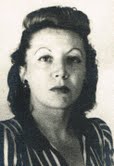Nydia Lamarque
Nydia Lamarque | |
|---|---|
| Born | 1906 |
| Died | 1982 |
| Occupation | Poet |

Nydia Lamarque (1906–1982) was an Argentinian poet. In addition to publishing several books of poetry, she was a lawyer, activist, and translator.[1] She was associated with the socialism and feminism movements.
Biography
Early life
Lamarque was born in Buenos Aires and was of partial French descent on her father's side.[2] At age 12, she began writing poetry.[2]
Poetry and translation
In 1925, Lamarque published Telarañas, her first book of poetry.[3][4] In 1927, she published Elegía del gran amor.[4][5] In 1930, her third work, Los cíclopes: una epopeya en la calle Sucre, was published.[6] In 1950, she published Acta de acusación de la vida,[7] and in 1951, she published Echeverría el poeta.[8][9]
She was fluent in French and was known as a "prominent translator of French literature,"[1] translating the work of "Baudelaire, Racine, Rimbaud,[10] Henri De Man, Adolfo Boschot, and Héctor Berlioz."[4] In 1948, she published the first translation of Baudelaire in Argentina.[11]

Law career
Lamarque worked as a defense attorney and was hired by the Red International Association.[12]
Socialism and feminism
Lamarque was involved in Boedo, a "vanguard writers' group," and was a member of Ateneo Feminino Buenos Aires.[4] She was also associated with the Argentinean Communist Party[1] and "concerned [herself] with social problems."[13] She served as president of the Argentinean Antiwar Committee and organized the Latin American Antiwar Conference in March 1933.[1]
In July 1933, Lamarque published an article in the magazine Contra, in which she argued that "art, as a product and synthesis of social factors, reflects the reality of society" and that "pure art is the decadence of the bourgeoisie" and defended the "triumphant proletarian art of the U.S.S.R."[1]
Critical reception
In 1925, Jorge Luis Borges wrote positively about Lamarque's work in Spanish, comparing it to Alfonsina Storni's and saying that it had neither "the vagueness nor the gossipy shrillness that this Storni tends to offer us."[14] He dedicated his poetry collection, Fervor of Buenos Aires, to Lemarque.[15][16]
In Literatura Argentina Contemporanea, literary critic Juan Pinto referred to Lamarque as "the poetess with the most masculine voice of our literature."[4]
References
- ^ a b c d e "ICAA Documents > THE ARCHIVE > Full Record". icaadocs.mfah.org. Retrieved 2016-05-15.
- ^ a b Culture française, Volumes 5-7. 1972.
- ^ Lamarque, Nydia (1925-01-01). Telarañas: sonetos (in Spanish). Libréria "La Facultad", J. Roldán & cía.
- ^ a b c d e "Nydia Lamarque (1906-1982) | Composite". bookmaniac.org. Retrieved 2016-05-15.
- ^ Lamarque, Nydia (1927-01-01). Elegia del gran amor (in Spanish). Editorial Proa.
- ^ Lamarque, Nydia (1930-01-01). Los cíclopes: una epopeya en la calle Sucre (in Spanish). Editorial El Inca.
- ^ Lamarque, Nydia (1950-01-01). Acta de acusación de la vida (in Spanish).
- ^ Lamarque, Nydia (1951-01-01). Echeverría el poeta (in Spanish).
- ^ Mercado, Juan Carlos (1996). Building a Nation: The Case of Echeverria. University Press of America. ISBN 9780761801146.
- ^ Jitrik, Noé (1999). Historia crítica de la literatura argentina: Rupturas. Emecé Editores. ISBN 9789500431446.
- ^ Venturini, Santiago. "Comparative Literature and Translation: Two Argentinean Versions of the Baudelairean Spleen" (PDF).
- ^ Ciria, Alberto (1974). Parties and Power in Modern Argentina 1930-1946. SUNY Press. ISBN 9780873950794.
- ^ Imbert, Enrique Anderson (1969). Spanish-American Literature: A History. Wayne State University Press. ISBN 9780814313886.
- ^ Women, Culture, and Politics in Latin America. University of California Press. 1992. p. 107. ISBN 9780520909076.
- ^ "The Missing Borges". Ropi Publications. 2015-07-23. Retrieved 2016-05-15.
- ^ Mochkofsky, Graciela (2014-04-16). "The Missing Borges". Paris Review Daily. Retrieved 2016-05-15.
